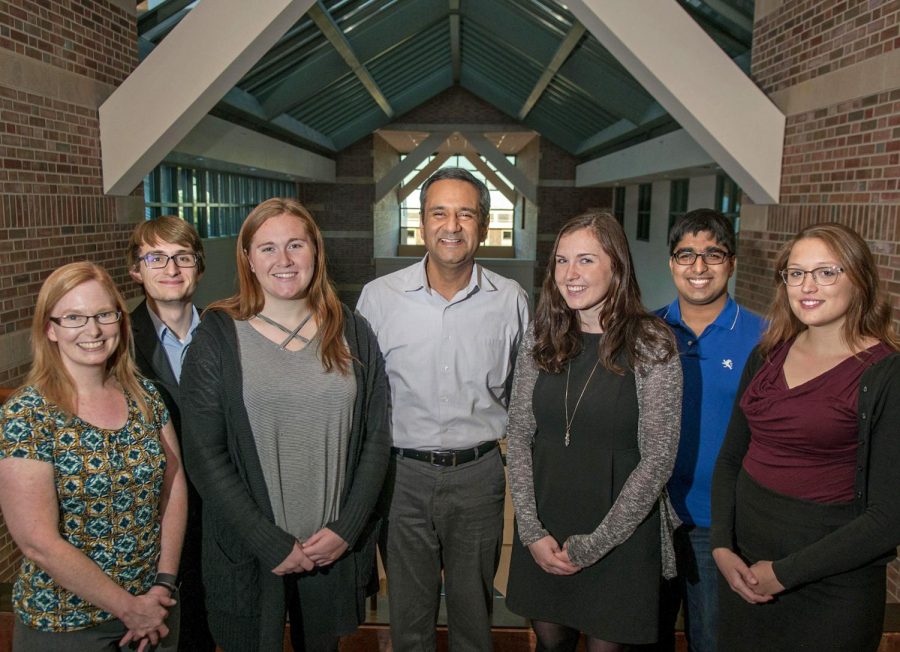First group of Cancer Scholars to graduate
Photo courtesy of Dr. Rohit Bhargava
Cancer Scholars Director Rohit Bhargava (center) joins Program Advisor Marcia Pool (far left) and a few of the first cohort of undergraduate students (left to right): Pierce Hadley, Lauren Sargeant, Madelyn O’Gorman, Sreyesh Satpathy, and Miranda Dawson outside Bhargava’s office at the Beckman Institute.
Jan 25, 2018
The first group of students from the Cancer Scholars program are set to graduate from the University this spring.
The Cancer Scholars program is a four-year undergraduate program designed to provide students with a framework for approaching cancer research.
The program covers a variety of topics, ranging from engineering to public policy, and ties them all together into cancer research.
Students are guaranteed research opportunities and summer research stipends. Pierce Hadley, senior in the program, said that the program resembles an organized bookshelf full of books about different aspects of cancer.
Four years ago, the 12 students accepted into the program started off by taking a class called Frontiers in Cancer Research.
Get The Daily Illini in your inbox!
“The course created a casual, yet professional atmosphere where researchers across campus could share with us their work and introduce very diverse approaches to cancer research,” Lauren Sargeant, senior in the program, said in an email.
Sargeant said she was introduced to the work of professor Gregory Underhill through Frontiers in Cancer Research.
“I was interested in his research and so I sent him an email – his response was that we should have a meeting and I should bring my resume,” Sargeant said. “That was in November 2014 and I am still working in his lab today – 6 semesters and 3 summers later.”
Earlier this year, Sargeant was named a co-author on a research paper from her work in Professor Underhill’s lab. The paper is still in the review process, but she said she hopes the manuscript will be accepted and published.
The program also consists of classes on government policy and medical device development. It also involved working closely with engineers across multiple fields, Hadley said.
Hadley said his junior year capstone project consisted of working with electrical engineers to develop viable project and business ideas from scratch.
Miranda Dawson, senior in the program, took her research in an entirely different direction.
“I cooperated with a biologist who was studying liver cancer in mice. Normal mice, genetically changed mice, mice with different diets, and we were able to correlate these changes with tumor progression,” Dawson said.
The different focuses of the students haven’t stopped them from building close ties. Sargeant said getting to know her peers was a highlight of the program.
“My freshman year, Professor Bhargava invited us all to his house for a Christmas party,” Sargeant said. “It has been exciting to be able to develop personal relationships not only with the other students in the program, but also with the faculty, staff and mentors who have supported myself and all of us over the last four years.”
The rigorous and discussion-based curriculum helped the scholars develop critical and inquisitive thinking skills, Hadley said.
“Professor Bhargava had the confidence in me and the support for me to continually ask questions. You always got to question the status quo. You learn to connect these completely different topics together and find the continuous thread,” he said.
Being involved in research helps encourage intellectual maturity and helps the scholars figure out what they like and what they don’t like, Dawson said.
Now, the scholars are in the process of applying for PhD and MD programs at a variety of schools.
“There’s a need for engineers in medicine that can design and build and bring a lot of our technology to clinical inspiration,” Hadley said.






